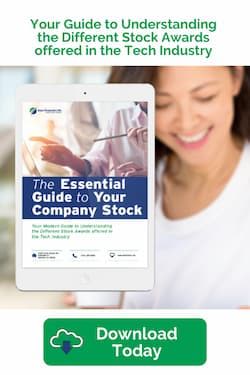
Does your company compensate you with RSUs or company stock?
Many employees receive some form of equity as part of their compensation package. RSUs, or restricted stock units, are a common form of that equity.
Accessing and optimizing your RSUs can be an intricate process and demands careful planning for employees to get the most of their earned equity.
What is an RSU?
An RSU is a "restricted stock unit," or a dressed-up name for ownership in your employer's business. Many industry and tech employees receive RSUs as part of their standard compensation. RSUs are an incentive offered by companies to draw and keep their employees.
RSUs give employees a certain number of company shares, subject to a vesting schedule. A vesting schedule is a program based on an incentive established by your employer and dictates when your right to your shares are activated.
Compared to other forms of equity payout, RSUs are more straightforward. With RSUs, the shares become yours upon vesting. There is no purchase or acquisition needed. Once these shares vest, they are yours to hold even if you part from the company.
This type of compensation is attractive to prospective employees because they can receive a substantial financial benefit if the company performs well and the share price increases. Naturally, this incentive encourages employees to take ownership of workplace success.
Think of Your RSUs as a Delayed Bonus Payment.
Typically, RSU shares are awarded to employees around review time, but they vest over 3-4 years. This means that you do not truly own all of the shares until that date arrives. For example, today’s awards vest over four years and will become yours in chunks of 25% each of the next four years.
On the day they are awarded, you do not know how much they will be worth because their value depends on the stock price as they vest over the next several years. If you were to leave the company before those four years are up, the remaining awards would be forfeited.
Because this "bonus payment" comes in the form of stock, it is up to you to decide when to sell the stock and obtain your money.
When Should You Sell Your RSUs?
The first step in preparing to sell your RSUs is determining what percentage of your assets are tied to company performance. In simpler terms, what percentage of your assets are in company stock?
- If your assets total over 10%, you’re in the gambling zone. Because your income is already coming from your employer a large chunk of what you own is tied to them as well. Whether or not to gamble with these assets is up to you, but it is crucial to understand that they can quickly vaporize.
- If your company investments are under 10%, we suggest creating a plan to sell all your vested shares to reduce your exposure. As mentioned, your income is tied to your company, and you likely have a significant portion of your wealth in unvested shares as well.
After you've decided to sell some or all your RSUs, you need a plan that accommodates the desire to reduce your company exposure and minimize the taxes you’ll pay. We’ll apply this to both the unvested shares and vested shares.
Sound difficult? It doesn’t have to be. Let us familiarize you with your RSUs and demystify the process of selling them.
